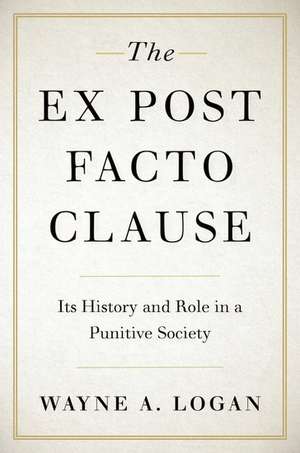The Ex Post Facto Clause: Its History and Role in a Punitive Society: STUDIES CRIME AMD PUBLIC POLICY SERIES
Autor Wayne A. Loganen Limba Engleză Hardback – 21 dec 2022
Preț: 226.18 lei
Preț vechi: 260.41 lei
-13% Nou
Puncte Express: 339
Preț estimativ în valută:
43.29€ • 47.04$ • 36.39£
43.29€ • 47.04$ • 36.39£
Carte disponibilă
Livrare economică 20-26 martie
Preluare comenzi: 021 569.72.76
Specificații
ISBN-13: 9780190053505
ISBN-10: 019005350X
Pagini: 312
Dimensiuni: 237 x 164 x 28 mm
Greutate: 0.58 kg
Editura: Oxford University Press
Colecția OUP USA
Seria STUDIES CRIME AMD PUBLIC POLICY SERIES
Locul publicării:New York, United States
ISBN-10: 019005350X
Pagini: 312
Dimensiuni: 237 x 164 x 28 mm
Greutate: 0.58 kg
Editura: Oxford University Press
Colecția OUP USA
Seria STUDIES CRIME AMD PUBLIC POLICY SERIES
Locul publicării:New York, United States
Recenzii
Professor Wayne Logan—renowned expert on sex offender registration, felon disfranchisement, and other collateral sanctions—now provides the definitive study of the Constitution's prohibition on retroactive laws. Logan shows that the Ex Post Facto Clause was originally intended as a broad protection of the most vilified and vulnerable against persecution. He provides a devastating critique of the US Supreme Court's history of contriving arbitrary exceptions to this fundamental principle and shows how these have contributed to excesses of the war on crime. This is first rate work.
An important contribution to our understanding of the punitive turn in US penal policies. Logan's comprehensive scholarship demonstrates the role of contemporary judge-made constitutional doctrine in enabling our long war on crime and recovers the lost constitutional tradition of checking the abuses of penal populism that would be vital to ending it.
This is a richly detailed account of an understudied constitutional clause that presents an innovative argument for its reinvigoration. Logan's work directly contributes to legal and historical scholarship on American constitutional and criminal law, but political scientists, sociologists, and criminologists interested in criminal justice reform will be interested in his prescription to use the provision to check punitive lawmaking. Many laws with retroactive impacts on the lives of convicted individuals-including those mandating sex offender registration and notification or prohibiting convicted felons from certain occupations, among others-do not receive ex post facto coverage under current doctrine. Logan's case for a new approach is fresh and valuable.
This is a richly detailed account of an understudied constitutional clause that presents an innovative argument for its reinvigoration. Logan's work directly contributes to legal and historical scholarship on American constitutional and criminal law, but political scientists, sociologists, and criminologists interested in criminal justice reform will be interested in his prescription to use the provision to check punitive lawmaking...As research grows exploring the problems of American criminal justice, The Ex Post Facto Clause is a noteworthy contribution advancing a novel argument to reinterpret an oft-ignored constitutional tool to constrain punitive lawmaking.
An important contribution to our understanding of the punitive turn in US penal policies. Logan's comprehensive scholarship demonstrates the role of contemporary judge-made constitutional doctrine in enabling our long war on crime and recovers the lost constitutional tradition of checking the abuses of penal populism that would be vital to ending it.
This is a richly detailed account of an understudied constitutional clause that presents an innovative argument for its reinvigoration. Logan's work directly contributes to legal and historical scholarship on American constitutional and criminal law, but political scientists, sociologists, and criminologists interested in criminal justice reform will be interested in his prescription to use the provision to check punitive lawmaking. Many laws with retroactive impacts on the lives of convicted individuals-including those mandating sex offender registration and notification or prohibiting convicted felons from certain occupations, among others-do not receive ex post facto coverage under current doctrine. Logan's case for a new approach is fresh and valuable.
This is a richly detailed account of an understudied constitutional clause that presents an innovative argument for its reinvigoration. Logan's work directly contributes to legal and historical scholarship on American constitutional and criminal law, but political scientists, sociologists, and criminologists interested in criminal justice reform will be interested in his prescription to use the provision to check punitive lawmaking...As research grows exploring the problems of American criminal justice, The Ex Post Facto Clause is a noteworthy contribution advancing a novel argument to reinterpret an oft-ignored constitutional tool to constrain punitive lawmaking.
Notă biografică
Wayne A. Logan is the Steven M. Goldstein Professor of Law at Florida State University. He is the author or co-author of several books and almost a hundred book chapters and law review articles, with work appearing in such publications as the Georgetown Law Journal, the Michigan Law Review, the Pennsylvania Law Review, and the Texas Law Review. He is an elected member of the American Law Institute and a past chair of the Criminal Justice Section of the Association of American Law Schools.


